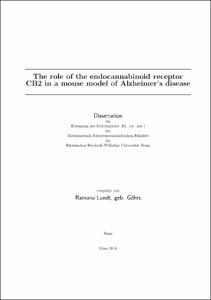The role of the endocannabinoid receptor CB2 in a mouse model of Alzheimer's disease

The role of the endocannabinoid receptor CB2 in a mouse model of Alzheimer's disease

| dc.contributor.advisor | Zimmer, Andreas | |
| dc.contributor.author | Lundt, Ramona | |
| dc.date.accessioned | 2020-04-25T11:40:50Z | |
| dc.date.available | 2020-04-25T11:40:50Z | |
| dc.date.issued | 26.09.2018 | |
| dc.identifier.uri | https://hdl.handle.net/20.500.11811/7637 | |
| dc.description.abstract | Over the past years, an important role of the cannabinoid receptor 2 (CB2) has been implicated in several neurological and immunological conditions, such as experimental autoimmune encephalitis, stroke, memory, neuropathic pain or Alzheimer's disease (AD). In AD transgenic mouse models, AD-associated neuroin ammatory processes were shown to decrease by the pharmacological stimulation with agonists of the endocannabinoid system (ECS), while age- and AD-associated cognitive deficits were diminished. However, the exact mechanism by which CB2 might be involved in these processes still remains elusive. Therefore, the current study was designed to analyse the effects of CB2 signalling on the one hand in microglia polarisation using in vitro cell-culture models. On the other hand, neuroin ammatory and neurodegenerative processes as well as changes in cognitive performances were evaluated in the AD transgenic mouse model APPswe/PS1dE9 (APP/PS1) and in mice lacking functional CB2 receptor expression (CB2-/-). We demonstrate here that neonatal microglia derived from CB2-/- mice were less responsive to pro-in ammatory stimuli when compared to microglia derived from wildtype mice. These findings were based on the cell surface marker expression of the intercellular adhesion molecule 1 (ICAM) and cluster of differentiation (CD) 40 as well as the release of the cytokines interleukin (IL) -6 and tumor necrosis factor (TNF) -α and the chemokine CCL2. Furthermore, we found a reduced amyloid-β (Aβ) plaque load in hippocampal and cortical regions, a reduced microgliosis, diminished markers of neuroin ammation as well as a decreased neurodegeneration in aged APP/PS1*CB2-/- mice when compared to samples of age-matched APP/PS1 mice. Finally, we could demonstrate that spatial learning and memory deficits were rescued in aged APP/PS1*CB2-/- mice. These data suggest that microglia polarisation is alternatively altered in the absence of CB2 signalling and positively in uenced AD-associated neuroin ammation in the present mouse model. | |
| dc.language.iso | eng | |
| dc.rights | In Copyright | |
| dc.rights.uri | http://rightsstatements.org/vocab/InC/1.0/ | |
| dc.subject | Alzheimer’s disease | |
| dc.subject | CB2 | |
| dc.subject | endocannabinoid system | |
| dc.subject | microglia | |
| dc.subject | neuroinflammation | |
| dc.subject.ddc | 570 Biowissenschaften, Biologie | |
| dc.subject.ddc | 610 Medizin, Gesundheit | |
| dc.title | The role of the endocannabinoid receptor CB2 in a mouse model of Alzheimer's disease | |
| dc.type | Dissertation oder Habilitation | |
| dc.publisher.name | Universitäts- und Landesbibliothek Bonn | |
| dc.publisher.location | Bonn | |
| dc.rights.accessRights | openAccess | |
| dc.identifier.urn | https://nbn-resolving.org/urn:nbn:de:hbz:5n-51957 | |
| ulbbn.pubtype | Erstveröffentlichung | |
| ulbbn.birthname | Göhrs | |
| ulbbnediss.affiliation.name | Rheinische Friedrich-Wilhelms-Universität Bonn | |
| ulbbnediss.affiliation.location | Bonn | |
| ulbbnediss.thesis.level | Dissertation | |
| ulbbnediss.dissID | 5195 | |
| ulbbnediss.date.accepted | 11.07.2018 | |
| ulbbnediss.institute | Medizinische Fakultät / Institute : Institut für Molekulare Psychiatrie (IMP) | |
| ulbbnediss.fakultaet | Mathematisch-Naturwissenschaftliche Fakultät | |
| dc.contributor.coReferee | Kolanus, Waldemar |
Files in this item
This item appears in the following Collection(s)
-
E-Dissertationen (4074)




